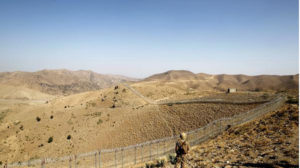The volatile region of South Asia often witnesses flare-ups and tensions between neighboring countries. In recent years, Pakistan’s airstrikes in Afghanistan have sparked concern and raised questions about the motives behind such actions. This article delves into the reasons behind Pakistan’s airstrikes, the intended targets, and the current state of relations between the two nations.  for more information click on this link
for more information click on this link
Context and Background The relationship between Pakistan and Afghanistan has been characterized by a complex interplay of factors, including historical grievances, border disputes, and security concerns. Both countries share a porous border that has been a conduit for cross-border terrorism, smuggling, and illicit activities. Additionally, Pakistan has been accused of providing support to certain militant groups operating in Afghanistan, further straining bilateral ties.
Motivations for Airstrikes Pakistan’s airstrikes in Afghanistan are often motivated by concerns over the presence of militant groups that Islamabad perceives as a threat to its security. These groups, including the Tehrik-i-Taliban Pakistan (TTP) and its affiliates, have found sanctuary in Afghan territory, launching attacks on Pakistani soil and destabilizing the region. In response, Pakistan has conducted targeted airstrikes to eliminate militant hideouts and disrupt their operations.
Pakistan’s Airstrikes in Afghanistan Targeted Groups and Locations The primary targets of Pakistan’s airstrikes in Afghanistan are militant strongholds and training camps operated by groups hostile to Islamabad. These include not only the TTP but also factions aligned with the Afghan Taliban and other extremist organizations. The border region between Pakistan’s tribal areas and Afghanistan’s eastern provinces has been a frequent target of Pakistani airstrikes, reflecting the presence of militant sanctuaries in the area.
Regional Dynamics and Geopolitical Considerations The airstrikes by Pakistan in Afghanistan are emblematic of the broader regional dynamics and geopolitical rivalries at play in South Asia. Pakistan’s actions are influenced by its longstanding rivalry with India and its desire to secure its western border against threats emanating from Afghanistan. Moreover, the involvement of external actors, including the United States and China, adds another layer of complexity to the situation.
Response Pakistan’s Airstrikes in Afghanistan :-
Pakistan’s Airstrikes in Afghanistan Current Status of Relations The relationship between Pakistan and Afghanistan remains fraught with challenges, characterized by mistrust, accusations, and occasional cooperation. Efforts to improve bilateral ties have been hampered by issues such as border management, refugee influx, and the presence of militant groups. Despite occasional diplomatic overtures and dialogue initiatives, deep-rooted grievances continue to impede progress towards lasting peace and stability in the region. Repercussions Pakistan’s airstrikes in Afghanistan have elicited mixed reactions from the international community and the Afghan government. While some view these actions as necessary to combat terrorism and stabilize the region, others have raised concerns about sovereignty violations and the potential for escalation. The Afghan government, in particular, has condemned Pakistani airstrikes on its territory, exacerbating tensions between the two neighbors.
Pakistan’s Airstrikes in Afghanistan Future Prospects and Challenges The path forward for Pakistan-Afghanistan relations is fraught with uncertainties and challenges. Both countries face daunting security, economic, and political obstacles that require concerted efforts and regional cooperation to overcome. Addressing the root causes of conflict, promoting dialogue, and enhancing mutual trust are essential steps towards building a more stable and prosperous future for South Asia.
Pakistan’s airstrikes in Afghanistan are a reflection of the complex security dynamics and geopolitical rivalries that shape the region. While driven by legitimate security concerns, these actions have implications for regional stability and the broader fight against terrorism. Moving forward, fostering constructive dialogue, respecting sovereignty, and addressing underlying grievances are crucial for building trust and promoting peace between Pakistan and Afghanistan.





